Strategies for SME Internationalization of Nigerian Agriculture
VerifiedAdded on 2019/09/16
|7
|1210
|272
Report
AI Summary
This report examines the strategies for Small and Medium-sized Enterprise (SME) internationalization within Nigeria's local agricultural business sector. The introduction highlights the importance of SMEs for economic growth, especially in developing countries like Nigeria, and the need for agricultural businesses to internationalize to overcome challenges such as lack of development, marketing problems, and unstable prices. The report aims to identify effective internationalization strategies for Nigerian agricultural SMEs, addressing the research question of what strategies can be used. A literature review explores internationalization, its benefits for SMEs (increased sales, risk diversification, access to technology), and the role of networks and market knowledge. The methodology section outlines a qualitative research design using a survey of 10 agricultural production companies that have successfully internationalized to gather primary data. The conclusion emphasizes the potential of this research to guide agricultural firms in Nigeria towards international expansion, providing valuable insights for future growth and development. The report references key academic sources that support the research.
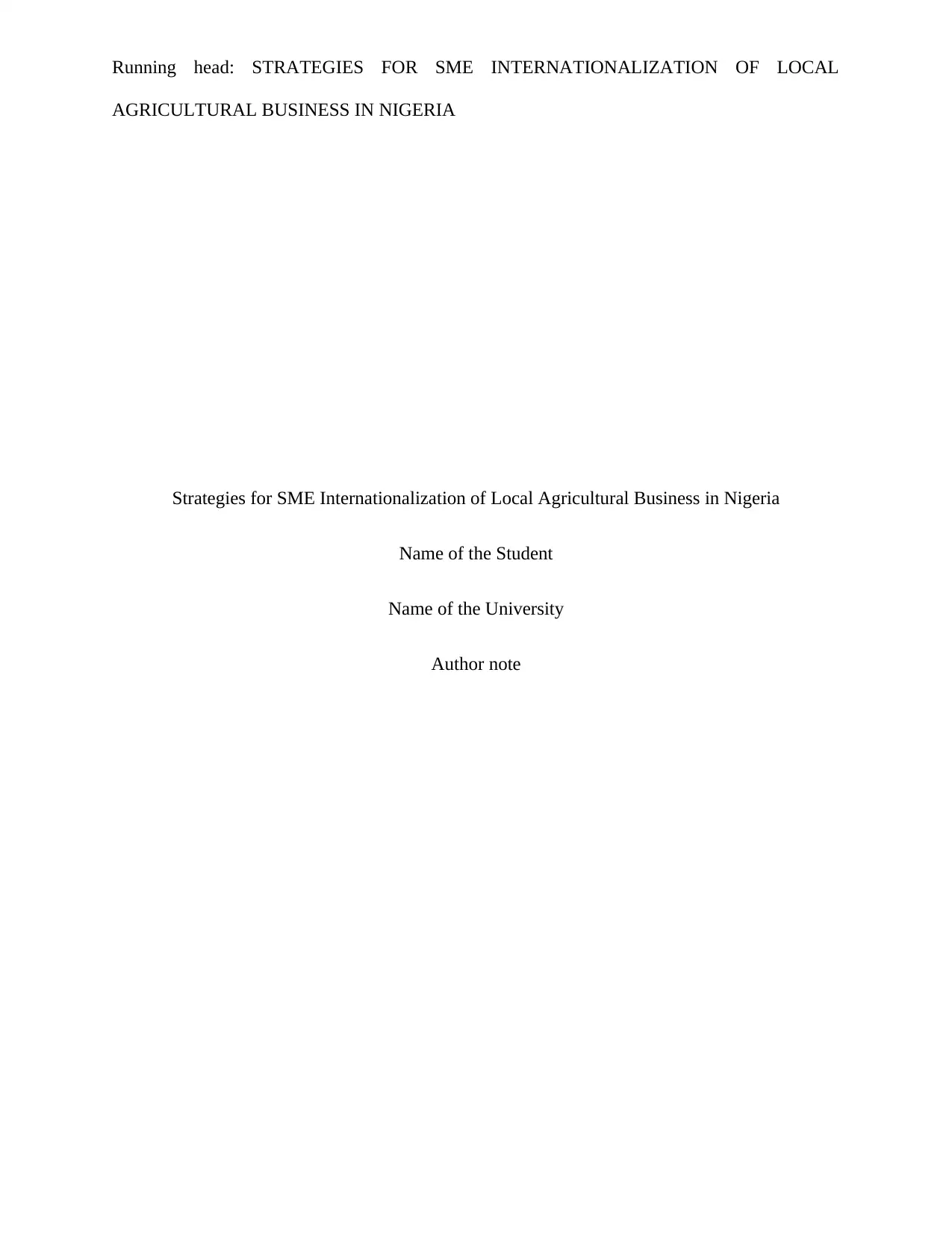
Running head: STRATEGIES FOR SME INTERNATIONALIZATION OF LOCAL
AGRICULTURAL BUSINESS IN NIGERIA
Strategies for SME Internationalization of Local Agricultural Business in Nigeria
Name of the Student
Name of the University
Author note
AGRICULTURAL BUSINESS IN NIGERIA
Strategies for SME Internationalization of Local Agricultural Business in Nigeria
Name of the Student
Name of the University
Author note
Paraphrase This Document
Need a fresh take? Get an instant paraphrase of this document with our AI Paraphraser
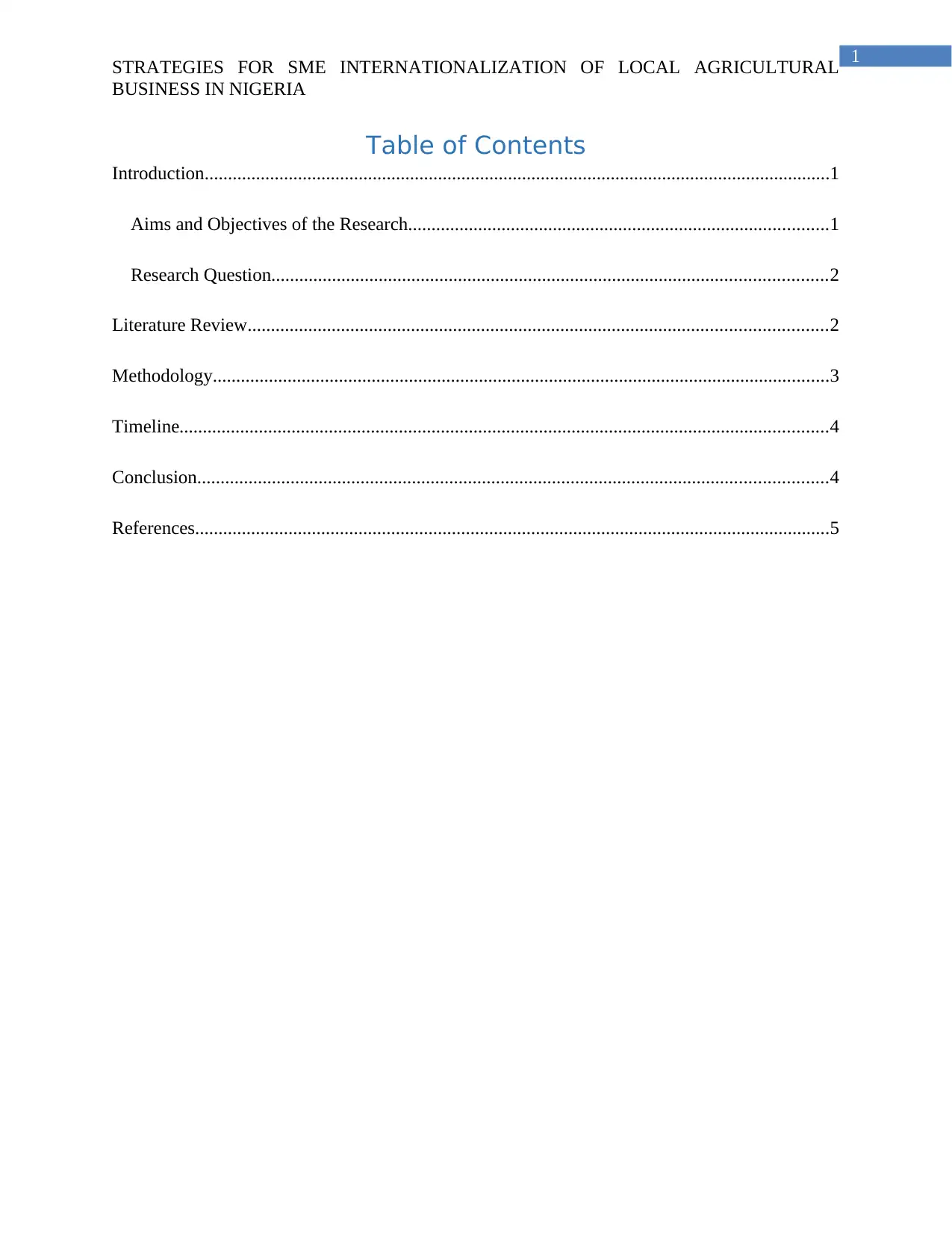
1
STRATEGIES FOR SME INTERNATIONALIZATION OF LOCAL AGRICULTURAL
BUSINESS IN NIGERIA
Table of Contents
Introduction......................................................................................................................................1
Aims and Objectives of the Research..........................................................................................1
Research Question.......................................................................................................................2
Literature Review............................................................................................................................2
Methodology....................................................................................................................................3
Timeline...........................................................................................................................................4
Conclusion.......................................................................................................................................4
References........................................................................................................................................5
STRATEGIES FOR SME INTERNATIONALIZATION OF LOCAL AGRICULTURAL
BUSINESS IN NIGERIA
Table of Contents
Introduction......................................................................................................................................1
Aims and Objectives of the Research..........................................................................................1
Research Question.......................................................................................................................2
Literature Review............................................................................................................................2
Methodology....................................................................................................................................3
Timeline...........................................................................................................................................4
Conclusion.......................................................................................................................................4
References........................................................................................................................................5
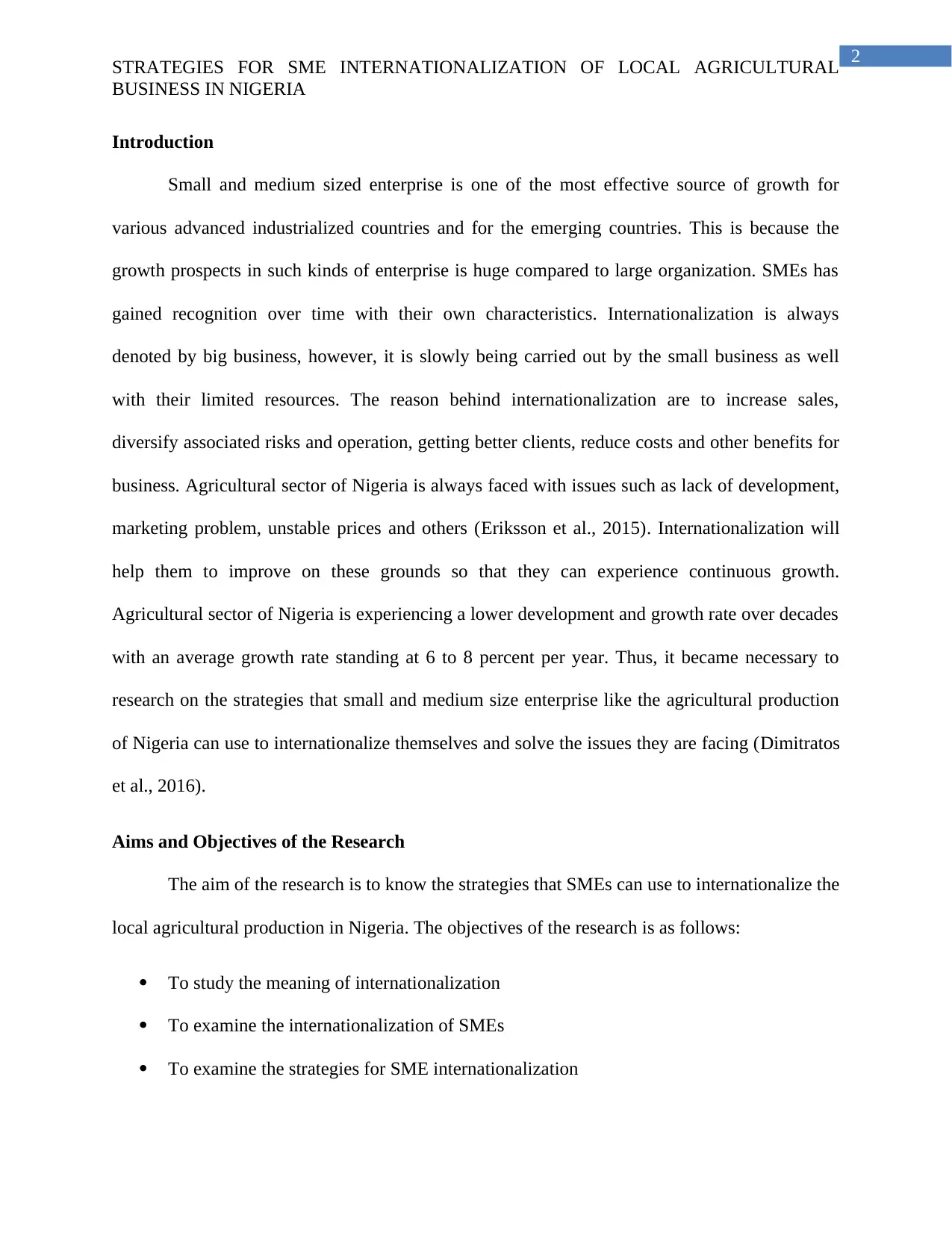
2
STRATEGIES FOR SME INTERNATIONALIZATION OF LOCAL AGRICULTURAL
BUSINESS IN NIGERIA
Introduction
Small and medium sized enterprise is one of the most effective source of growth for
various advanced industrialized countries and for the emerging countries. This is because the
growth prospects in such kinds of enterprise is huge compared to large organization. SMEs has
gained recognition over time with their own characteristics. Internationalization is always
denoted by big business, however, it is slowly being carried out by the small business as well
with their limited resources. The reason behind internationalization are to increase sales,
diversify associated risks and operation, getting better clients, reduce costs and other benefits for
business. Agricultural sector of Nigeria is always faced with issues such as lack of development,
marketing problem, unstable prices and others (Eriksson et al., 2015). Internationalization will
help them to improve on these grounds so that they can experience continuous growth.
Agricultural sector of Nigeria is experiencing a lower development and growth rate over decades
with an average growth rate standing at 6 to 8 percent per year. Thus, it became necessary to
research on the strategies that small and medium size enterprise like the agricultural production
of Nigeria can use to internationalize themselves and solve the issues they are facing (Dimitratos
et al., 2016).
Aims and Objectives of the Research
The aim of the research is to know the strategies that SMEs can use to internationalize the
local agricultural production in Nigeria. The objectives of the research is as follows:
To study the meaning of internationalization
To examine the internationalization of SMEs
To examine the strategies for SME internationalization
STRATEGIES FOR SME INTERNATIONALIZATION OF LOCAL AGRICULTURAL
BUSINESS IN NIGERIA
Introduction
Small and medium sized enterprise is one of the most effective source of growth for
various advanced industrialized countries and for the emerging countries. This is because the
growth prospects in such kinds of enterprise is huge compared to large organization. SMEs has
gained recognition over time with their own characteristics. Internationalization is always
denoted by big business, however, it is slowly being carried out by the small business as well
with their limited resources. The reason behind internationalization are to increase sales,
diversify associated risks and operation, getting better clients, reduce costs and other benefits for
business. Agricultural sector of Nigeria is always faced with issues such as lack of development,
marketing problem, unstable prices and others (Eriksson et al., 2015). Internationalization will
help them to improve on these grounds so that they can experience continuous growth.
Agricultural sector of Nigeria is experiencing a lower development and growth rate over decades
with an average growth rate standing at 6 to 8 percent per year. Thus, it became necessary to
research on the strategies that small and medium size enterprise like the agricultural production
of Nigeria can use to internationalize themselves and solve the issues they are facing (Dimitratos
et al., 2016).
Aims and Objectives of the Research
The aim of the research is to know the strategies that SMEs can use to internationalize the
local agricultural production in Nigeria. The objectives of the research is as follows:
To study the meaning of internationalization
To examine the internationalization of SMEs
To examine the strategies for SME internationalization
⊘ This is a preview!⊘
Do you want full access?
Subscribe today to unlock all pages.

Trusted by 1+ million students worldwide
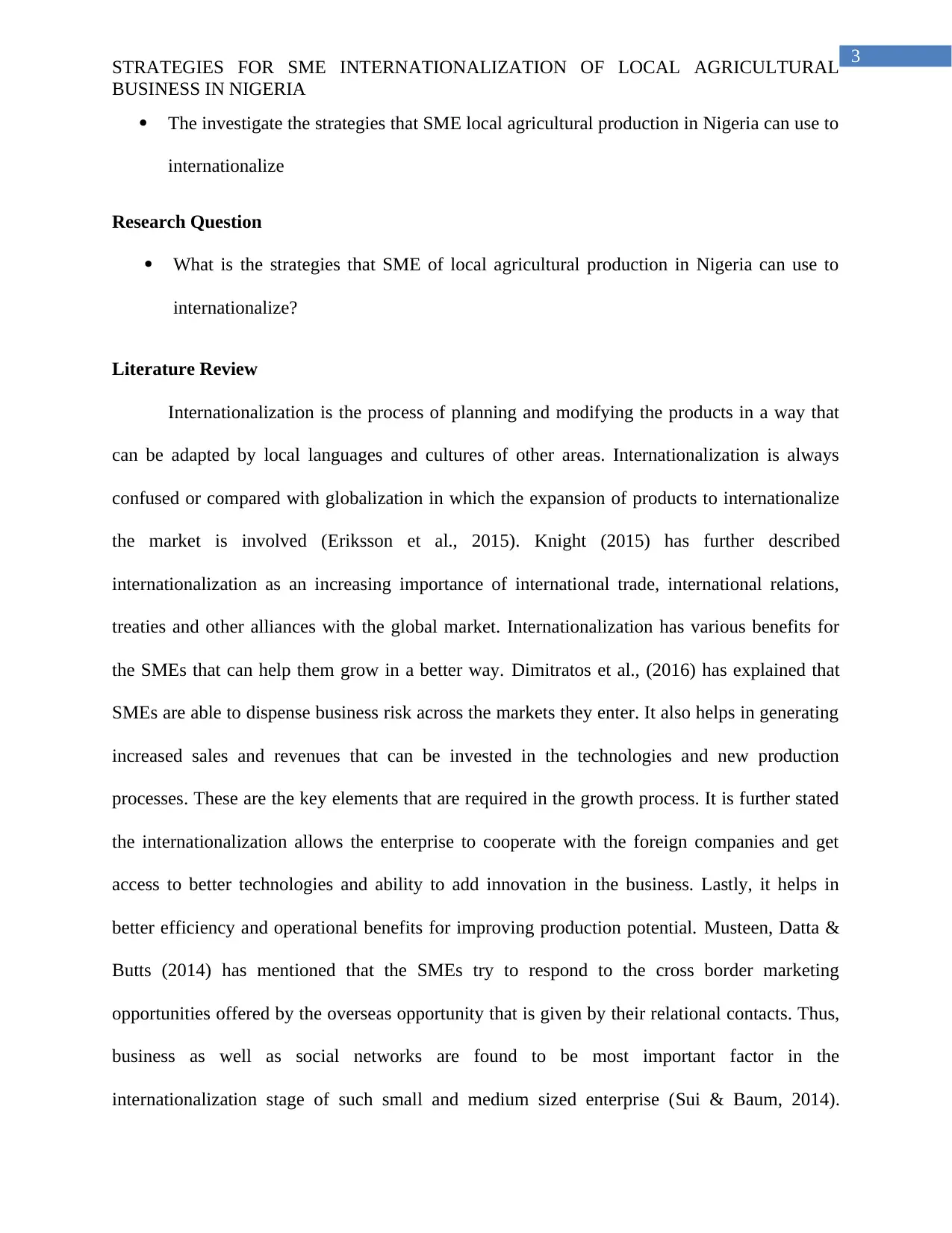
3
STRATEGIES FOR SME INTERNATIONALIZATION OF LOCAL AGRICULTURAL
BUSINESS IN NIGERIA
The investigate the strategies that SME local agricultural production in Nigeria can use to
internationalize
Research Question
What is the strategies that SME of local agricultural production in Nigeria can use to
internationalize?
Literature Review
Internationalization is the process of planning and modifying the products in a way that
can be adapted by local languages and cultures of other areas. Internationalization is always
confused or compared with globalization in which the expansion of products to internationalize
the market is involved (Eriksson et al., 2015). Knight (2015) has further described
internationalization as an increasing importance of international trade, international relations,
treaties and other alliances with the global market. Internationalization has various benefits for
the SMEs that can help them grow in a better way. Dimitratos et al., (2016) has explained that
SMEs are able to dispense business risk across the markets they enter. It also helps in generating
increased sales and revenues that can be invested in the technologies and new production
processes. These are the key elements that are required in the growth process. It is further stated
the internationalization allows the enterprise to cooperate with the foreign companies and get
access to better technologies and ability to add innovation in the business. Lastly, it helps in
better efficiency and operational benefits for improving production potential. Musteen, Datta &
Butts (2014) has mentioned that the SMEs try to respond to the cross border marketing
opportunities offered by the overseas opportunity that is given by their relational contacts. Thus,
business as well as social networks are found to be most important factor in the
internationalization stage of such small and medium sized enterprise (Sui & Baum, 2014).
STRATEGIES FOR SME INTERNATIONALIZATION OF LOCAL AGRICULTURAL
BUSINESS IN NIGERIA
The investigate the strategies that SME local agricultural production in Nigeria can use to
internationalize
Research Question
What is the strategies that SME of local agricultural production in Nigeria can use to
internationalize?
Literature Review
Internationalization is the process of planning and modifying the products in a way that
can be adapted by local languages and cultures of other areas. Internationalization is always
confused or compared with globalization in which the expansion of products to internationalize
the market is involved (Eriksson et al., 2015). Knight (2015) has further described
internationalization as an increasing importance of international trade, international relations,
treaties and other alliances with the global market. Internationalization has various benefits for
the SMEs that can help them grow in a better way. Dimitratos et al., (2016) has explained that
SMEs are able to dispense business risk across the markets they enter. It also helps in generating
increased sales and revenues that can be invested in the technologies and new production
processes. These are the key elements that are required in the growth process. It is further stated
the internationalization allows the enterprise to cooperate with the foreign companies and get
access to better technologies and ability to add innovation in the business. Lastly, it helps in
better efficiency and operational benefits for improving production potential. Musteen, Datta &
Butts (2014) has mentioned that the SMEs try to respond to the cross border marketing
opportunities offered by the overseas opportunity that is given by their relational contacts. Thus,
business as well as social networks are found to be most important factor in the
internationalization stage of such small and medium sized enterprise (Sui & Baum, 2014).
Paraphrase This Document
Need a fresh take? Get an instant paraphrase of this document with our AI Paraphraser
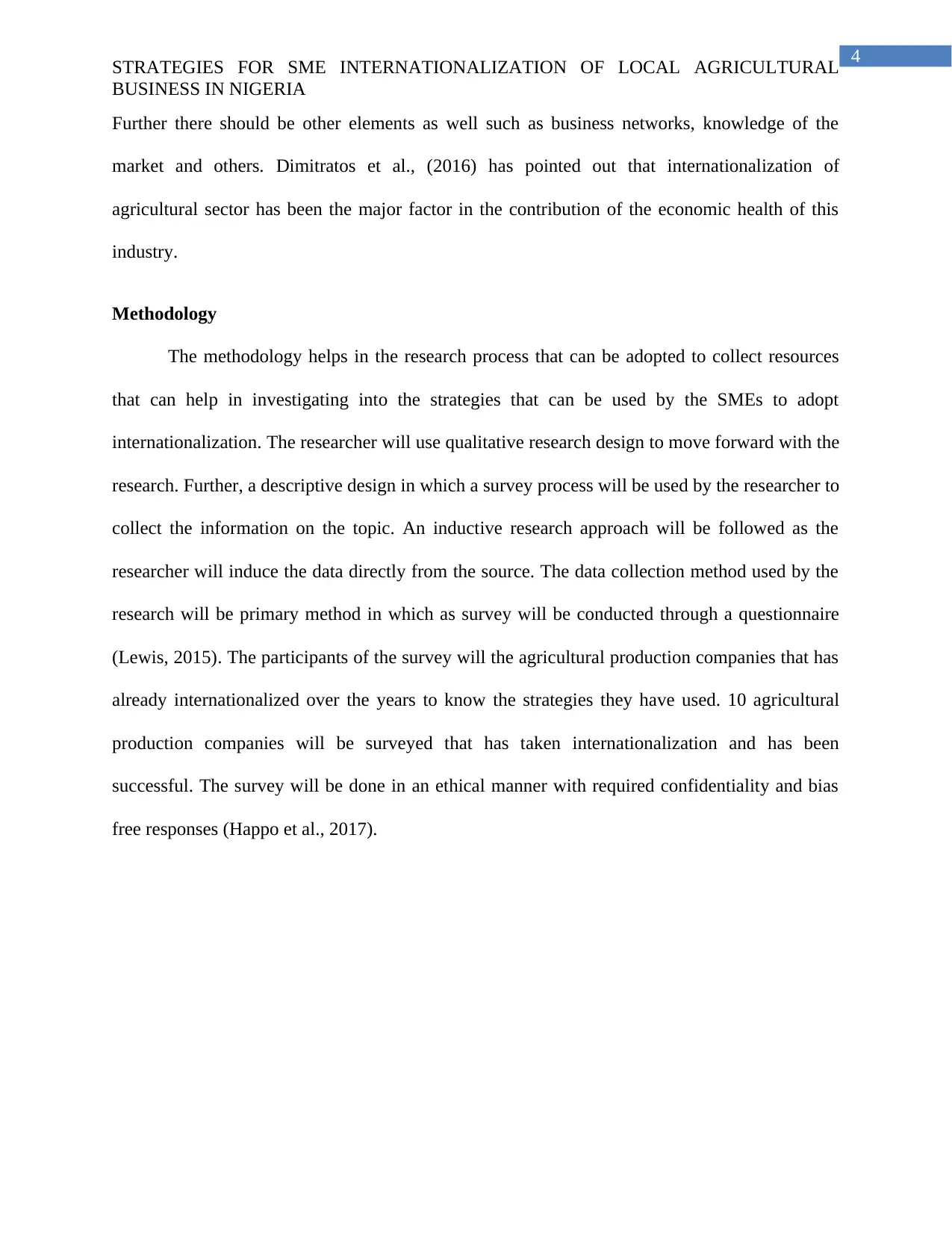
4
STRATEGIES FOR SME INTERNATIONALIZATION OF LOCAL AGRICULTURAL
BUSINESS IN NIGERIA
Further there should be other elements as well such as business networks, knowledge of the
market and others. Dimitratos et al., (2016) has pointed out that internationalization of
agricultural sector has been the major factor in the contribution of the economic health of this
industry.
Methodology
The methodology helps in the research process that can be adopted to collect resources
that can help in investigating into the strategies that can be used by the SMEs to adopt
internationalization. The researcher will use qualitative research design to move forward with the
research. Further, a descriptive design in which a survey process will be used by the researcher to
collect the information on the topic. An inductive research approach will be followed as the
researcher will induce the data directly from the source. The data collection method used by the
research will be primary method in which as survey will be conducted through a questionnaire
(Lewis, 2015). The participants of the survey will the agricultural production companies that has
already internationalized over the years to know the strategies they have used. 10 agricultural
production companies will be surveyed that has taken internationalization and has been
successful. The survey will be done in an ethical manner with required confidentiality and bias
free responses (Happo et al., 2017).
STRATEGIES FOR SME INTERNATIONALIZATION OF LOCAL AGRICULTURAL
BUSINESS IN NIGERIA
Further there should be other elements as well such as business networks, knowledge of the
market and others. Dimitratos et al., (2016) has pointed out that internationalization of
agricultural sector has been the major factor in the contribution of the economic health of this
industry.
Methodology
The methodology helps in the research process that can be adopted to collect resources
that can help in investigating into the strategies that can be used by the SMEs to adopt
internationalization. The researcher will use qualitative research design to move forward with the
research. Further, a descriptive design in which a survey process will be used by the researcher to
collect the information on the topic. An inductive research approach will be followed as the
researcher will induce the data directly from the source. The data collection method used by the
research will be primary method in which as survey will be conducted through a questionnaire
(Lewis, 2015). The participants of the survey will the agricultural production companies that has
already internationalized over the years to know the strategies they have used. 10 agricultural
production companies will be surveyed that has taken internationalization and has been
successful. The survey will be done in an ethical manner with required confidentiality and bias
free responses (Happo et al., 2017).
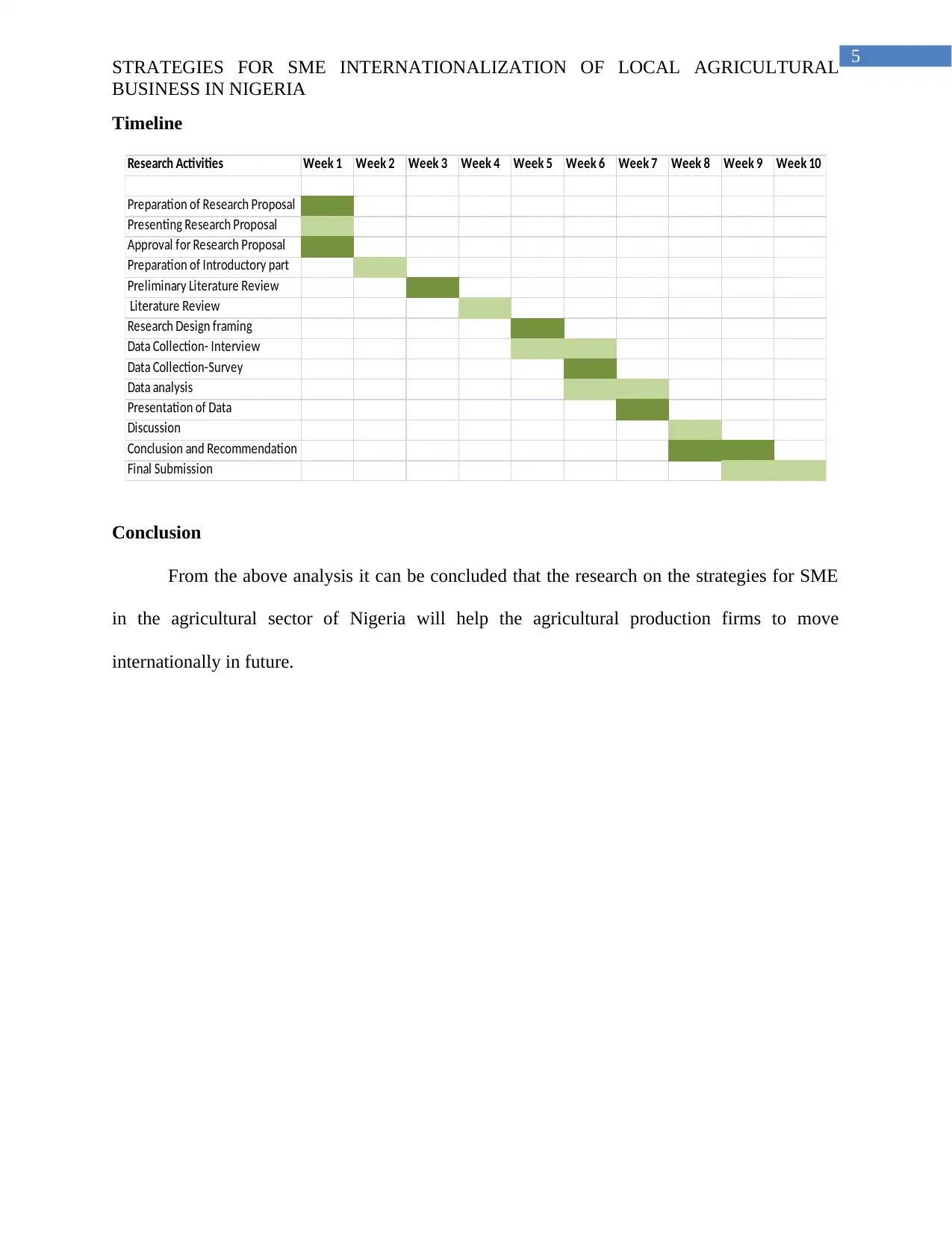
5
STRATEGIES FOR SME INTERNATIONALIZATION OF LOCAL AGRICULTURAL
BUSINESS IN NIGERIA
Timeline
Research Activities Week 1 Week 2 Week 3 Week 4 Week 5 Week 6 Week 7 Week 8 Week 9 Week 10
Preparation of Research Proposal
Presenting Research Proposal
Approval for Research Proposal
Preparation of Introductory part
Preliminary Literature Review
Literature Review
Research Design framing
Data Collection- Interview
Data Collection-Survey
Data analysis
Presentation of Data
Discussion
Conclusion and Recommendation
Final Submission
Conclusion
From the above analysis it can be concluded that the research on the strategies for SME
in the agricultural sector of Nigeria will help the agricultural production firms to move
internationally in future.
STRATEGIES FOR SME INTERNATIONALIZATION OF LOCAL AGRICULTURAL
BUSINESS IN NIGERIA
Timeline
Research Activities Week 1 Week 2 Week 3 Week 4 Week 5 Week 6 Week 7 Week 8 Week 9 Week 10
Preparation of Research Proposal
Presenting Research Proposal
Approval for Research Proposal
Preparation of Introductory part
Preliminary Literature Review
Literature Review
Research Design framing
Data Collection- Interview
Data Collection-Survey
Data analysis
Presentation of Data
Discussion
Conclusion and Recommendation
Final Submission
Conclusion
From the above analysis it can be concluded that the research on the strategies for SME
in the agricultural sector of Nigeria will help the agricultural production firms to move
internationally in future.
⊘ This is a preview!⊘
Do you want full access?
Subscribe today to unlock all pages.

Trusted by 1+ million students worldwide
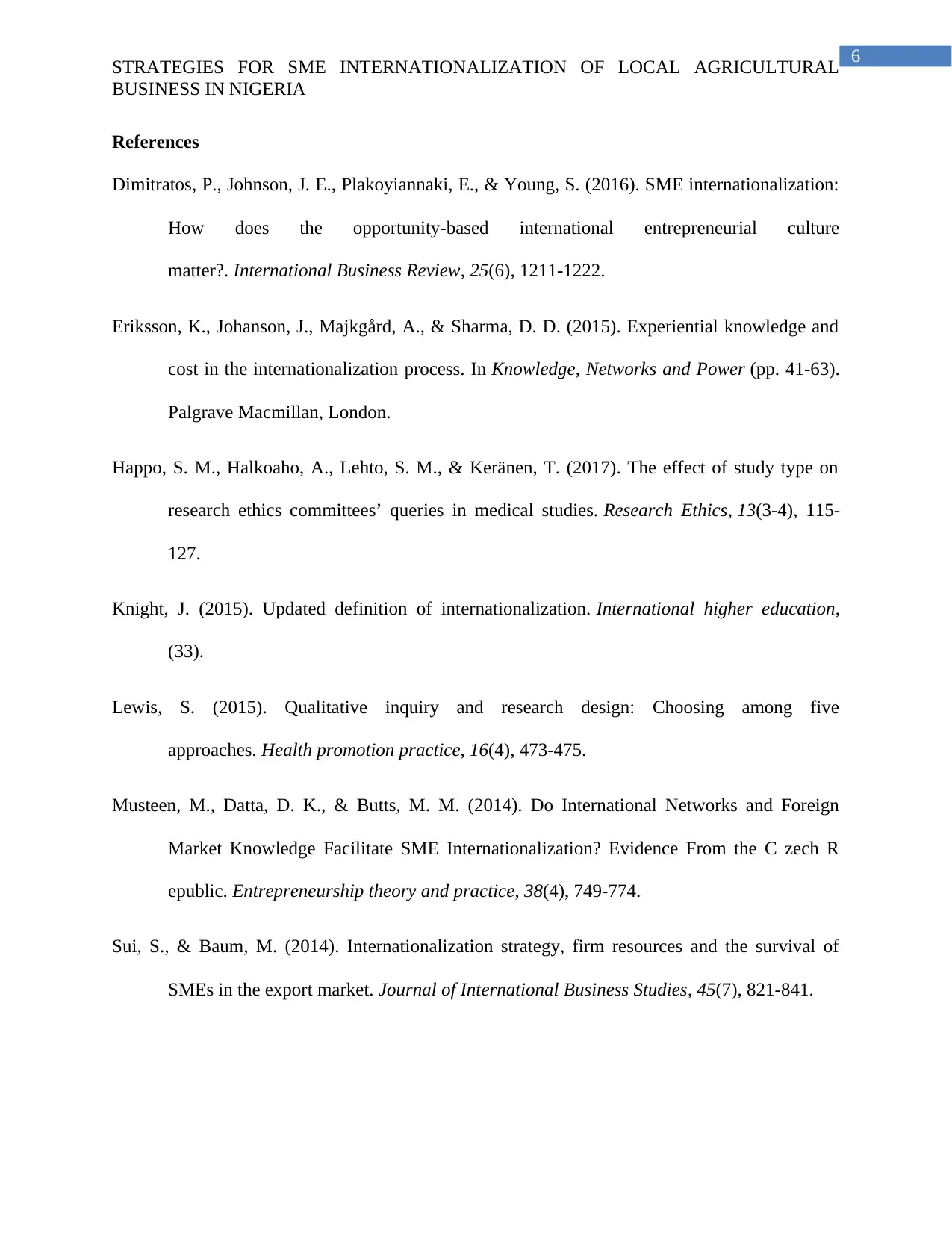
6
STRATEGIES FOR SME INTERNATIONALIZATION OF LOCAL AGRICULTURAL
BUSINESS IN NIGERIA
References
Dimitratos, P., Johnson, J. E., Plakoyiannaki, E., & Young, S. (2016). SME internationalization:
How does the opportunity-based international entrepreneurial culture
matter?. International Business Review, 25(6), 1211-1222.
Eriksson, K., Johanson, J., Majkgård, A., & Sharma, D. D. (2015). Experiential knowledge and
cost in the internationalization process. In Knowledge, Networks and Power (pp. 41-63).
Palgrave Macmillan, London.
Happo, S. M., Halkoaho, A., Lehto, S. M., & Keränen, T. (2017). The effect of study type on
research ethics committees’ queries in medical studies. Research Ethics, 13(3-4), 115-
127.
Knight, J. (2015). Updated definition of internationalization. International higher education,
(33).
Lewis, S. (2015). Qualitative inquiry and research design: Choosing among five
approaches. Health promotion practice, 16(4), 473-475.
Musteen, M., Datta, D. K., & Butts, M. M. (2014). Do International Networks and Foreign
Market Knowledge Facilitate SME Internationalization? Evidence From the C zech R
epublic. Entrepreneurship theory and practice, 38(4), 749-774.
Sui, S., & Baum, M. (2014). Internationalization strategy, firm resources and the survival of
SMEs in the export market. Journal of International Business Studies, 45(7), 821-841.
STRATEGIES FOR SME INTERNATIONALIZATION OF LOCAL AGRICULTURAL
BUSINESS IN NIGERIA
References
Dimitratos, P., Johnson, J. E., Plakoyiannaki, E., & Young, S. (2016). SME internationalization:
How does the opportunity-based international entrepreneurial culture
matter?. International Business Review, 25(6), 1211-1222.
Eriksson, K., Johanson, J., Majkgård, A., & Sharma, D. D. (2015). Experiential knowledge and
cost in the internationalization process. In Knowledge, Networks and Power (pp. 41-63).
Palgrave Macmillan, London.
Happo, S. M., Halkoaho, A., Lehto, S. M., & Keränen, T. (2017). The effect of study type on
research ethics committees’ queries in medical studies. Research Ethics, 13(3-4), 115-
127.
Knight, J. (2015). Updated definition of internationalization. International higher education,
(33).
Lewis, S. (2015). Qualitative inquiry and research design: Choosing among five
approaches. Health promotion practice, 16(4), 473-475.
Musteen, M., Datta, D. K., & Butts, M. M. (2014). Do International Networks and Foreign
Market Knowledge Facilitate SME Internationalization? Evidence From the C zech R
epublic. Entrepreneurship theory and practice, 38(4), 749-774.
Sui, S., & Baum, M. (2014). Internationalization strategy, firm resources and the survival of
SMEs in the export market. Journal of International Business Studies, 45(7), 821-841.
1 out of 7
Related Documents
Your All-in-One AI-Powered Toolkit for Academic Success.
+13062052269
info@desklib.com
Available 24*7 on WhatsApp / Email
![[object Object]](/_next/static/media/star-bottom.7253800d.svg)
Unlock your academic potential
Copyright © 2020–2026 A2Z Services. All Rights Reserved. Developed and managed by ZUCOL.





